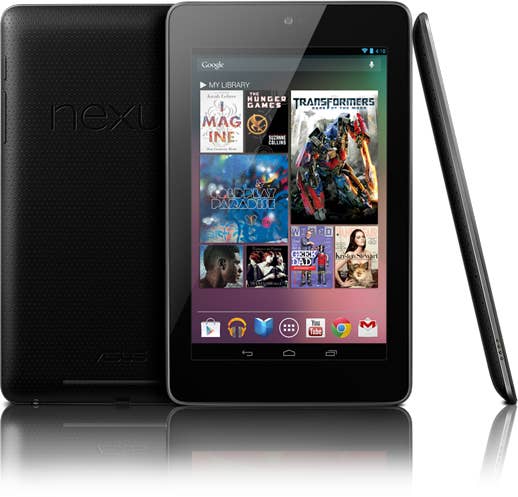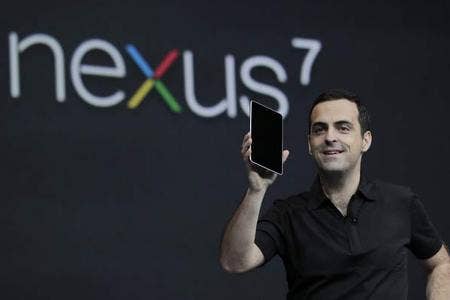Critical Consensus: Google Nexus 7
Google and Asus have created the first essential Android tablet, and a superior product to the Kindle Fire
In terms of hardware sales, no news is generally bad news. If a company's latest phone, laptop, TV, console, handheld or tablet is flying off the shelves it won't be able to get exact figures out soon enough; if the device is a struggling, you're more likely to hear about percentage increases and stolen market share.
Now, it would be unwise to suggest that the Kindle Fire is struggling, but after a strong start last year, Amazon's goal of launching a credible alternative to the iPad has started to look somewhat hopeful. The tablet has no doubt created a nice new revenue stream for the retail giant, but reports that unit sales have been well below Amazon's expectations are not hard to find, and, tellingly, exact sales figures certainly are.
So, with the possible exception of Samsung's Galaxy line, the tablet market is still very much the iPad market. And as much as Apple's design expertise makes us go all weak at the knees, it seems both desirable and inevitable that another tablet should come along, wow the critics, and steel a little of Tim Cook's lunch. The Google Nexus 7 may or may not be that device, but based on the reviews so far, it has the best chance of any Android tablet released to date.
"For those who only want to surf the web, check e-mail, play games and update their social media feeds, the Nexus 7 might be an even better choice than an iPad"
Wired
Produced in conjunction with Asus, the Nexus 7 runs on a quad-core Tegra 3 CPU that clocks at 1.3 Ghz, with 1GB of RAM and a 12-core graphics chip. The display is a 7-inch 1280 x 800 backlit IPS LCD in scratch-resistant "Corning glass", with pixel density of 216ppi - for the record, that's more than the iPad 2 and an 11-inch MacBook Pro. It supports Wi-Fi, Bluetooth 4.0, near-field communication. It has a GPS chip, a gyroscope, an accelerometer and a 1.2 megapixel front-facing camera.
Granted, it has no in-built support for 3G or 4G connectivity, and on-board storage is limited to 8GB and 16GB models, but there's a good reason: the 8GB Google Nexus will retail for $199.99, and the 16GB model will set you back an extra $50.
"That's the same price as the Amazon Kindle Fire and Barnes & Noble's Nook Tablet at the same storage capacity," notes Wired.com in its glowing 9 out of 10 review, the same score it awarded to Apple's latest iPad. "If you want a bit more room to download HD movies, music, games and apps, you can get the 16GB version for $250. At these prices, the Nexus 7 is frankly a steal when you compare it to what else is out there at the same cost."
Significantly, Wired believes the Nexus 7 stacks up very well against other devices that cost a good deal more. Specifically built to run Android 4.1 ("Jellybean"), Google's tablet avoids the "unresponsiveness, slow animations and stuttering screens" of other 7-inch devices, running as quickly and smoothly as almost any tablet on the market. "It feels as fast as Asus' larger Transformer tablets, and it performs as smoothly as the iPad, even when playing high definition games such as ShadowGun or playing back HD movies," the review notes.

"While the Nexus 7 isn't a full-on iPad-killer, it far out-classes anything else offered in the 7-inch category, and most 10-inch tablets too... For those who only use their gadgets to surf the web, check e-mail, play games and update their social media feeds, the Nexus 7 might be an even better choice than an iPad, given how much easier it is to carry around."
Endgadget is similarly impressed by the Nexus 7's performance relative to its price, even claiming that Google could reasonably have sold it for "much more" than the $200 asking price. However, despite tight integration with Google's full suite of services (maps, docs, gmail, Chrome, etc) and the Google Play store, the range of content available to Nexus 7 users is considerably smaller than on Kindle Fire.
"It has a great screen, solid performance and a clean, clear, uncluttered version of Google's latest operating system, Jelly Bean. From a pure hardware standpoint it beats the Kindle in every way possible - except for content. Amazon's selection almost always trumps that of Google's, both in terms of variety and cost, but that's one wonderful problem to have, because almost all of that content is just as available on the Nexus 7 as it is on the Fire. The only major exception is Amazon Instant Video, and with Netflix, we can live with that."
"Believe it or not, the last time I was surprised by a product with those same qualities, it was called the iPad"
The Verge
According to The Verge, Android 4.1 Jellybean is as much of a lure as the hardware itself. Indeed, the reviewer goes so far as to call the OS, "one of the best products that Google has ever produced," and comfortably ahead of both iOS and Windows Phone. This is helped in no small part by how complete Google's service suite has become, allowing Jellybean to connect and modify its various products to create a fluid and harmonious tablet experience. However, the same can't be said of third-party apps.
"While Google's new OS and latest app initiatives are very, very good, Android on tablets still suffers from an incredible lack of developer support. Mainstream apps like Twitter have yet to be updated to an appropriate tablet-friendly design, while others...seem to be slightly optimised but not working 100 per cent correctly. Some apps simply aren't optimised for the tablet in any way... This is still a problem Google needs to tackle if it's going to truly combat competitors in the space."
With the Android 4.1 SDK now available to developers the situation will likely improve over time, and these problems don't diminish what Asus and Google has achieved. Indeed, with an overall score of 8.8 out of 10, the only tablet to score higher is the most recent iPad.
"Google's Nexus 7 isn't just an excellent tablet for $200. It's an excellent tablet, period. In fact, it's the first Android tablet that I can confidently recommend to buyers - and not just because it's got a low price tag (though that certainly helps). It's a well-designed, powerful, and useful product, with lots of bells and whistles that makes it feel like a device that should be more expensive than it is.
"Believe it or not, the last time I was surprised by a product with those same qualities, it was called the iPad."

